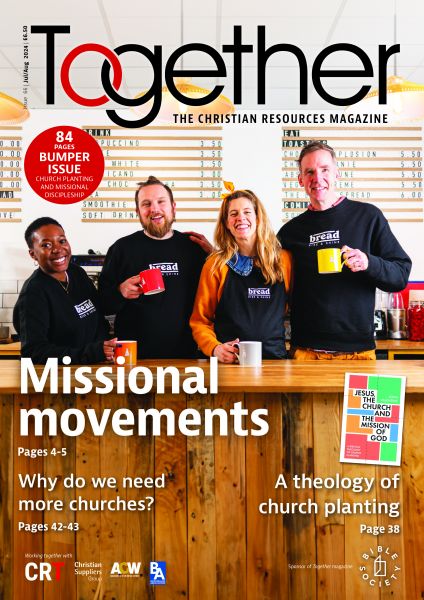Anglo-Catholic church planting: an interview with John Wallace
Added about 9 months ago by John Wallace

 INTERVIEW: In the July 2024 issue of Together magazine, Alan Mordue speaks to John Wallace about his book which discusses the challenges and opportunities of reaching new communities and planting new churches in the Anglo-Catholic tradition. Here is the interview in full.
INTERVIEW: In the July 2024 issue of Together magazine, Alan Mordue speaks to John Wallace about his book which discusses the challenges and opportunities of reaching new communities and planting new churches in the Anglo-Catholic tradition. Here is the interview in full.
What do you think are the unique challenges in church planting in an Anglo-Catholic setting?
Church planting is often seen as an activity undertaken by large evangelical/charismatic churches; as a result, Anglo-Catholics have generally been wary of involvement. Many still see it as ‘not for us’, although in my experience since undertaking this research, this attitude is changing.
Many churches have embraced the Mission-Shaped Church and Fresh Expressions models of church planting. Do these also work in the Anglo-Catholic context?
Many new forms of church which have grown up over the last 20 years are much looser in their liturgical and ecclesiological practices than well-established churches. This has proved a challenge to Anglo-Catholics who believe in structured liturgical worship. Although Mission-Shaped Church stresses that church growth and church planting is an activity for all kinds of church, the take-up has been much slower across Anglo-Catholic churches as a result of this.
In the book, you compare and contrast Anglo-Catholic churches today and in the Victorian era. What do you think is useful in this comparison?
The Victorian Anglo-Catholics were at the forefront of mission, especially in what we would now call ‘the inner cities’. We need to learn from their experience and see how applicable it is for today’s church.
Your book is very theological. What is the importance of theology underpinning all church work?
Alister McGrath stresses the importance of theology as the key underpinning component to church planting and church growth. Theology is essential, as it prevents church planting being merely a pragmatic solution to the perceived problem of falling numbers attending churches. It answers the ‘why’ question. Mission without theology is yet another humanly driven activity, very often to prove that ‘we are doing something’.
In an Anglo-Catholic setting, there must be many issues with liturgical worship. What do you think they are?
I touch on this in my book. It may not be possible in a church plant setting to replicate all the forms of liturgy which would take place in a parish church. For instance, some buildings would object to incense both from a sense point of view but also because it would set off the fire alarms. One of the churches described in my book meets in a church hall with a narrow platform for the altar. The priest has to celebrate from behind; if he adopted an eastern-facing position, he would be in danger of falling off backwards. So there is a need to adapt but not to water down.
I have always been interested in the Anglican appreciation of church history generally. How do you think this manifests itself?
History is important for all churches; without history, we are rootless. That doesn’t mean slavishly following the past and doing things because we have always done them this way. We need to ask ourselves why things are done. The danger is that things which once had a very practical reason become sacralised and pseudo-holy, so are not challenged. Liturgy must be a living thing. This is what drove the Victorian Anglo-Catholics to ‘rescue’ the church from dry and repetitive wordy services.
How did you feel writing a book on a topic that I don’t think has been covered as much as I would have expected, and what have you learned?
When I embarked on the doctoral research on which my book is based, I was amazed how little work had been undertaken in this area. Virtually all previous research and studies had concentrated on evangelical church plants. I had to start from an almost blank canvas and use a range of contacts and their contacts. Other leads were purely fortuitous. I was led to St Mary Magdalene, Paddington and its founder, Fr Richard Temple West, one of my Victorians, by a notice on the towpath of the Grand Union Canal near Paddington Station! I feel that I have learned for myself much more of the history of the Oxford Movement than the sketchy outline I previously had. But much more importantly, I saw the way in which God had worked in the 19th century and see that this work is still going on today in a very different religious and cultural milieu.
Anglo-Catholic Church Planting: Can it work? is available in paperback from Sacristy Press or your local Christian bookshop, and from all major e-book retailers.
This article was first published in Together, the Christian resources magazine and is reproduced with permission. Each issue of Together addresses a key topic relevant to the UK church today, with discussion from church leaders, book reviews, extracts and interviews. To find out more or to subscribe, visit www.togethermagazine.org.
Please note: Sacristy Press does not necessarily share or endorse the views of the guest contributors to this blog.
